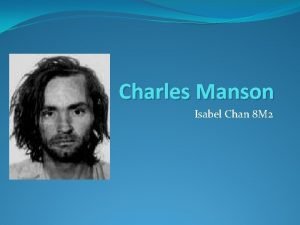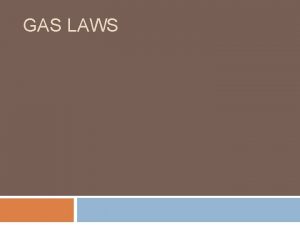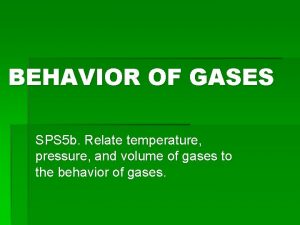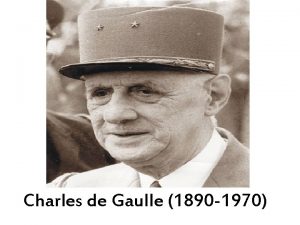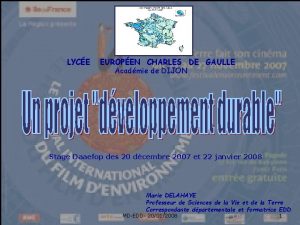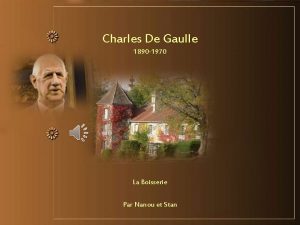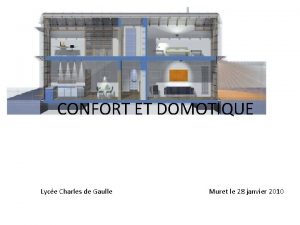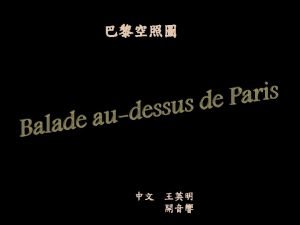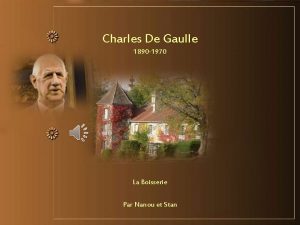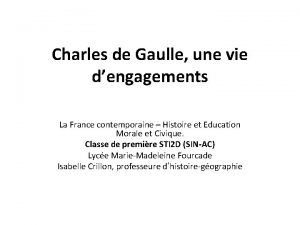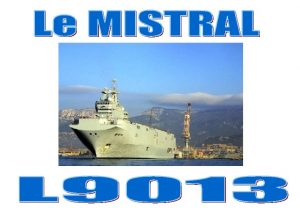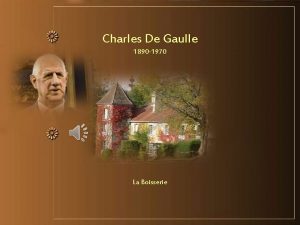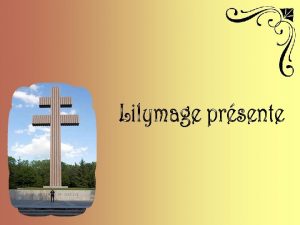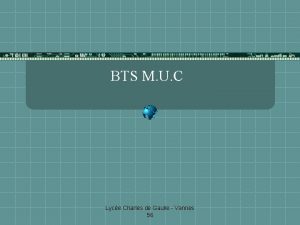Charles de Gaulle and the UK application J















- Slides: 15

Charles de Gaulle and the UK application J. Bugeja 1

Charles de Gaulle and the UK application (including the Empty Chair crisis) 1. Who was Charles De Gaulle? 2. De Gaulle and Europe 3. The Empty Chair Crisis 4. UK’s application and De Gaulle’s Veto. 5. Conclusion. 2

1. Who was Charles De Gaulle? 1. Born in 1890, in Lille, France. 2. Followed a military career. 3. World War II - became a public figure. 4. World War II - established the French Movement, a government in exile ( London). 5. After the Liberation of Paris (1944), he became President of the Provisional Government, guiding France through the writing of a new Constitution. 6. In 1958, De Gaulle regained power again. During his Presidency he: Initiated closer ties with West Germany (1963). Sanctioned the development of Nuclear Weapons. Withdraw France from NATO. Vetoed British entry in the EEC Allowed Algerian independence (1962) Ø Ø Ø 7. Violent demonstration by University students. De Gaulle had to resign after loosing a referendum in 1969. 3

2. De Gaulle and Europe Ø II World War – De Gaulle was determined to restore France to great power status. Ø He acted as the head of government of one of the most important countries in the world, equal to the US, Britain and the USSR. Ø The US, claimed that his thoughts of greatness did not fit his stature. Roosevelt – considered him as a potential dictator. 4

Ø Before 1958 – De Gaulle was: 1. against the EDC, 2. guarded French sovereignty, 3. anti-British, 4. anti-American, 5. and initially anti-German and anti-EEC. Ø From 1958 – 1969 - De Gaulle: 1. supported the idea of a European Union, but not at the expense of sovereignty, 2. he wanted France to dominate. 5

Ø De Gaulle adopted a policy with 3 main features; 1. Supported an intergovernmental core Europe. 2. An international policy to overcome the Cold War order. 3. Rejected the involvement of Great Britain. Organisation of cooperation between the 6 members. He wanted France and Europe to be independent of the two superpowers (US and USSR). He rejected Great Britain’s involvement as he wanted to preserve French influence. Cooperation, not integration. Sovereignty not supra-nationalism. A Union of States. 6

3. The Empty Chair Crisis Ø In June 1965, De Gaulle helped precipitate one of the greatest crises in the history of the EC, the Empty Chair Crisis. Ø It involved the financing of the Common Agricultural Policy, but almost more importantly the use of qualified majority in the EC. Ø After France and the other five members could not agree, France boycotted the meetings of the Council and insisted on a political agreement concerning the role of the Commission and majority voting if it were to participate again. Ø Their absence left the organisation essentially unable to run its affairs. Ø This crisis was resolved thanks to the Luxembourg compromise (January 1966), which stated that "when vital interests of one or more countries are at stake , members of the Council will endeavour to reach solutions that can be adopted by all while respecting their mutual interests. " 7

Ø In July 1965, the German cartoonist, Siegl, uses the myth of the abduction of Europa to illustrate the reaction of the Federal Chancellor, Ludwig Erhard, to the decision taken by General Charles de Gaulle, to boycott the intergovernmental meetings of the Community bodies in Brussels, thereby provoking the ‘empty chair’ crisis. 8

4. UK’s application and De Gaulle’s Veto. 1. Before 1945 – The UK had an Empire, a place in the UN’s Security Council and nuclear power. Saw itself as the equal of the USA and the USSR. 2. Since the beginning of the ECSC negotiations, the UK maintained its distance from developments that led to the formation of a number of European level organisations. 3. UK restored from negotiations, preferring to remain in an organisation know as the EFTA – based on a free trade area without common power institutions able to impose resolutions on member states. 9

4. 5. Due to economic crises in the UK and the success of the EEC, the British tried to join the Community. Formal application – 19 th August 1961, Brussels, 6. - Conservative Government of Harold Macmillan. Application opposed by French President, De Gaulle vetoed the UK’s application because: a) UK was closely allied with the US. US President Kennedy had backed British membership – entrance of a Trojan Horse (US) in Europe. b) UK represented a threat to the hegemony of France. De Gaulle, ’ In the end there would appear a colossal Atlantic Community under American dependence and leadership which would swallow up the EEC’. 10 10

7. Second Application to join the ECC was made in May 1967 – Labour Government led by Harold Wilson. 8. Labour Government recognised that EEC membership was necessary: to sustain British trade, To ensure its political influence Ø Ø 9. The UK understood that EFTA and the Commonwealth were not the answer to its economic problems. 11

9. President De Gaulle, once again exercised his state’s veto, adding that British economic weakness as a reason for the second no. 10. As long, as De Gaulle remained the French President, there was no chance for the UK to join the EEC. 12

11. 3 rd Application: 1969. 12. By 1969, De Gaulle retired from politics (1969) and his sucessor Georges Pompidou was less hostile to the UK. 13. Pompidou had no objection to British membership. 14. Conservative British Prim minister, Edward Heath, was pro-European and had good working The UK became a member of the EEC in January 1973. 13

5. Conclusion Ø De Gaulle had a huge influence in developing the European building process and in slowing the speed of integration. Ø Ideas were baldly applied when he was in power and defended them consistently. Ø He thought that ti was possible to have a nationalist approach in the 20 th century. Ø Yet he had the ability to adapt and change his views as needed for the sake of this country. 14

The End J. Bugeja 15
 Charles luther manson
Charles luther manson Charles's law application in real life
Charles's law application in real life Application of boyle's law in daily life
Application of boyle's law in daily life Hình ảnh bộ gõ cơ thể búng tay
Hình ảnh bộ gõ cơ thể búng tay Lp html
Lp html Bổ thể
Bổ thể Tỉ lệ cơ thể trẻ em
Tỉ lệ cơ thể trẻ em Gấu đi như thế nào
Gấu đi như thế nào Chụp phim tư thế worms-breton
Chụp phim tư thế worms-breton Chúa sống lại
Chúa sống lại Môn thể thao bắt đầu bằng chữ đua
Môn thể thao bắt đầu bằng chữ đua Thế nào là hệ số cao nhất
Thế nào là hệ số cao nhất Các châu lục và đại dương trên thế giới
Các châu lục và đại dương trên thế giới Công thức tính độ biến thiên đông lượng
Công thức tính độ biến thiên đông lượng Trời xanh đây là của chúng ta thể thơ
Trời xanh đây là của chúng ta thể thơ Mật thư anh em như thể tay chân
Mật thư anh em như thể tay chân
